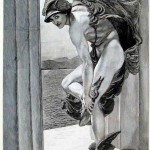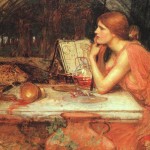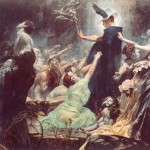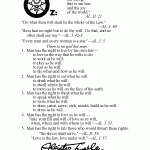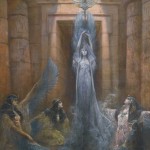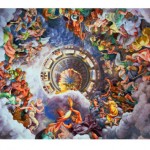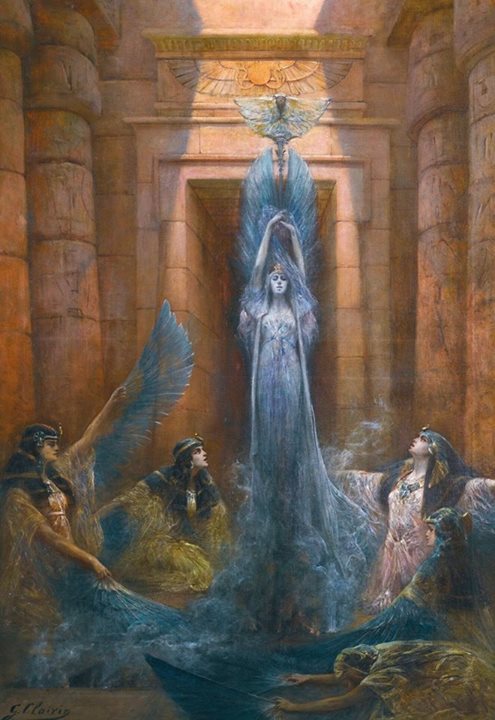 Polytheism is a consequence of knowing more than one Deity. Who and what are these beings we esteem and worship? Are They the Gods?
Polytheism is a consequence of knowing more than one Deity. Who and what are these beings we esteem and worship? Are They the Gods?
Before talking about one, a grounding in some understanding of Them-All is a good place to start. Raised an observant Catholic, I professed belief in the Father, Son, and Holy Spirit every Sunday at mass. But the experience of Divine presence in the ritual and eucharist made belief superfluous. Too bad They turned out to be unworthy of worship.
Reckoning with the Gods in daily life, Their unignorable presences makes for living in a Divine and ‘enchanted’ world. Except for a brief period of denial in my early teens, I have generally been aware of Them, especially that aspect of the Divine that ever faces towards me, like It does for all beings.
Experience, however, is not understanding but the data of understanding. So I have spent a significant part of my life trying to understand these experiences and sought education to support that exploration. Not a practical choice, but driven by soul-need. This has lead me to study, often in institutions of advanced learning, the theological traditions of the West, mainly Christian or its derivatives, as well as Vedic, Buddhist, Taoist, ancient Egyptian, Greek and Roman thought. I’ve also had the opportunity to learn from Cherokee, Pueblo, and Shuar in person, and a variety of other sources just from books. Likewise since the early 1980s I’ve been having serious theological conversation in our own community and hosted discussions at events like Pantheacon. This is, of course, on top of all the individual, often late night conversations that happen on our travels.
Naturally this as lead me to some conclusions; opinions that I have cultivated across the years and have ‘tried’ through argument and incisive reason, tested through ritual and meditative practice, and sought confirmation and support from the Deities I’ve come to know, love, and serve (They can be quite tight-lipped about these things). A complete framing of my ideas on the matter, a systematic theology, is too long for a blog post, so over time I will address aspects of the total space of my thought as fit. In recent years I’ve been blogging and a sample of my thought has been on Witches & Pagans, Patheos and the Wild Hunt. This new series develops those ideas further, but focuses now on working with Deities, especially Hermes, my Patron of Art.
My epistemological foundation is always experience. From this I derive propositions about the character of that experience. These propositions are then examined in the light of the theological frameworks I’ve studied. I hold them in great esteem, but I am not beholden to any of them. Ultimately, my thought is founded on my experience and however much enlightened by my study, I have the responsibility to derive my own conclusions…
Let us start with the Gods as we experience them. Much to my surprise, I am no longer convinced that the Beings we experience are the Gods Themselves. What we are experiencing is a projection of Those who are Gods refracted through our souls and the cultures we are a part of. Even the ancient Greeks had ideas of this nature. They realized that when a cow sees a Deity, the Deity looks bovine, not human. It is our human nature that makes the Gods, who themselves are formless, to take on such form as we can communicate with (They have no such limitations). This kind of awareness led the Neoplatonists to postulate many levels of Being which connect and moderate the presence of the Many Divine from the Source of being, the One, down to matter, the lowest extension of the Divine in their thought. The Gods Themselves are the manifest Manynesses that were the potencies inchoate in the One That Is All, the originary Whole of Being. These are, in the theology of the Neoplatonic framework, the Noetic Gods. They are the beings of the realm of pure mind, beyond the cosmos, matter and soul, yet distinct (at this level) from the One-Whole. In the language of philosophy They are also the Platonic Forms, the primordial ‘eternal objects’ from which all existence is ‘made’. (I tend to think less in terms of ‘construction’ or making than in terms of growing or self-creation.) All that is can be understood as the union of any number of these Forms, or said another way, everything is a child of many Gods.
As such the Deities are the Cosmogonic Archetypes, not to be confused with Jungian or psychological archetypes. Jungian archetypes, how so ever derived from the cosmogonic are nonetheless psychological entities. They exist in the medium of human minds, individually and collectively. While potentially echos of Deities, psychological archetypes are limited and bound by the human. Cosmogonic Archetypes lie utterly beyond any human boundaries. They are the powers and structures of Being, far beyond nature or even matter. They are the primal causes of existence and all things derive their nature from them. They were long before our planet, even our universe was formed. Otherwise they would not be Gods. This should make us wary to presume that the entities we actually deal with are the Gods Themselves. While directly and causally derived from Those that Are, the Gods of human myth and experience are partly a product of dealing with us.
In the interactions of the Noetic Ones with us an interface level develops that is human enough for us to deal with. These are the Beings who exhibit passions and of which the Poets tell their ‘fan-fic’. One of the problems we have in understanding the ancient Gods today is that so much of our knowledge of them comes from the Poets who took the liberty of telling stories about Them and in doing so imputed to the Deities passionate qualities and immoral behavior. The true Gods, being the structures of existence are wholly good. They can be no more immoral than gravity can, which incidentally (in the Greek) is the power of Aphrodite amongst masses. A danger is that we can treat these entertainments as though they were scripture, a projection of our culture’s relationship to the Bible back onto the ancients. Homer had some authority, but those who were endeavoring to understand the Gods Themselves did not accept the picture he so vividly painted in his epics. Indeed, some philosophers said that Homer was strung up by one foot on the edge of the Elysium Fields for his impropriety towards the Divine Ones. From these stories we can build up impressions of the Gods that is quite at variance to how the ancients actually saw the Gods. My personal annoyance is with the presentation of Zeus. Having a (late) spouse and numerous friends both female and male who experienced the abuse of rape, the dismissal of the Thunderer as a mere rapist does Him no justice. As we turn from the poetry to the hymns, we see how Zeus was actually seen, as a just Ruler, as the Demiurge, as the Father of the Gods, the Bringer of Rain, the Defender of Strangers, and as the Avenger of Injustice. We need to be more sophisticated in our use of the ancient sources.
It is more useful to start with the liturgical texts, when we have them, that small fraction of the hymns that remain and were written in praise and invocation of the Gods. We would best study how those who tried to critically express the nature of the Gods such as the philosophers, who were the theologians of their day, and then get to know the Deities directly though invocation and offering. Then only will we know Them and not merely about Them.

